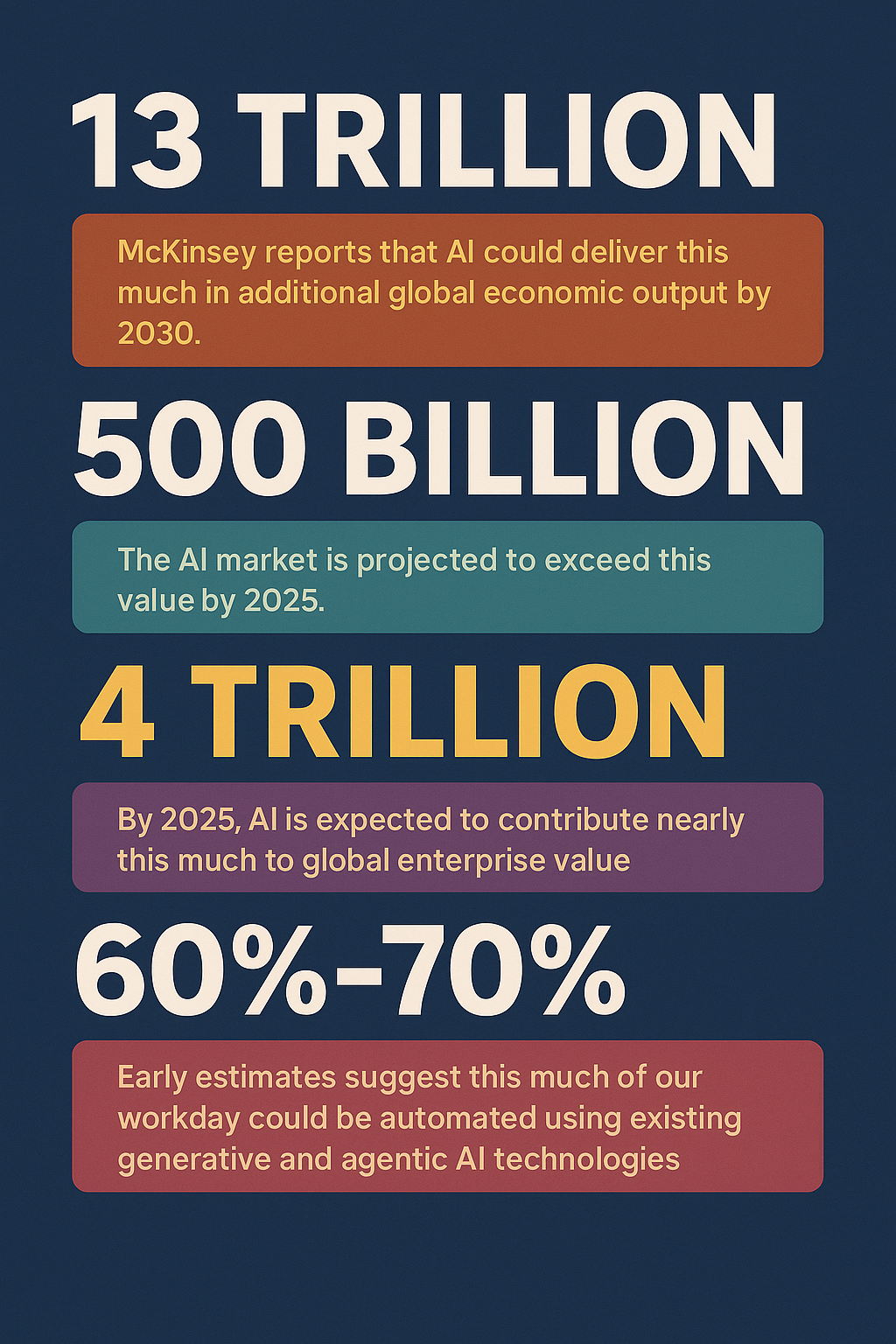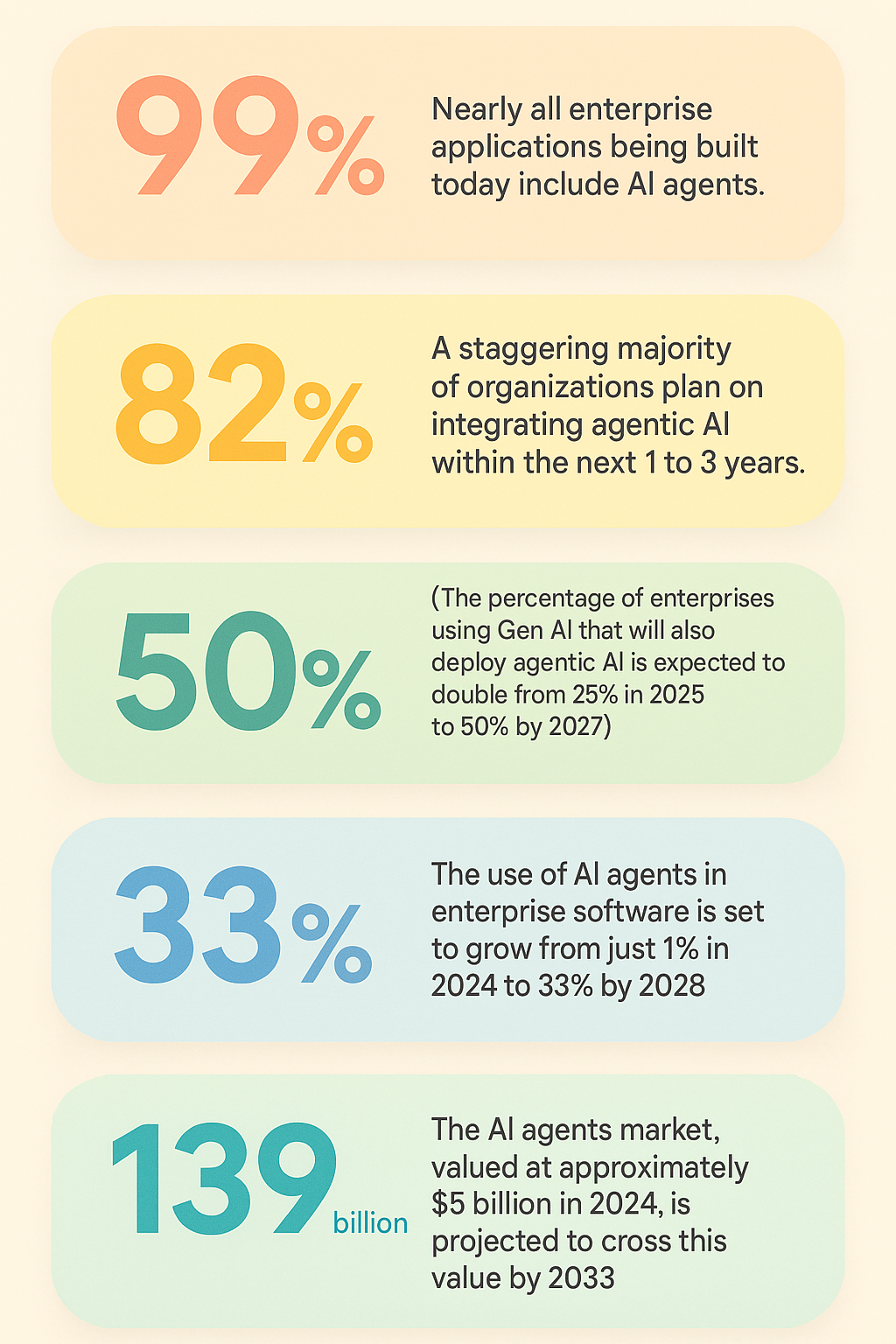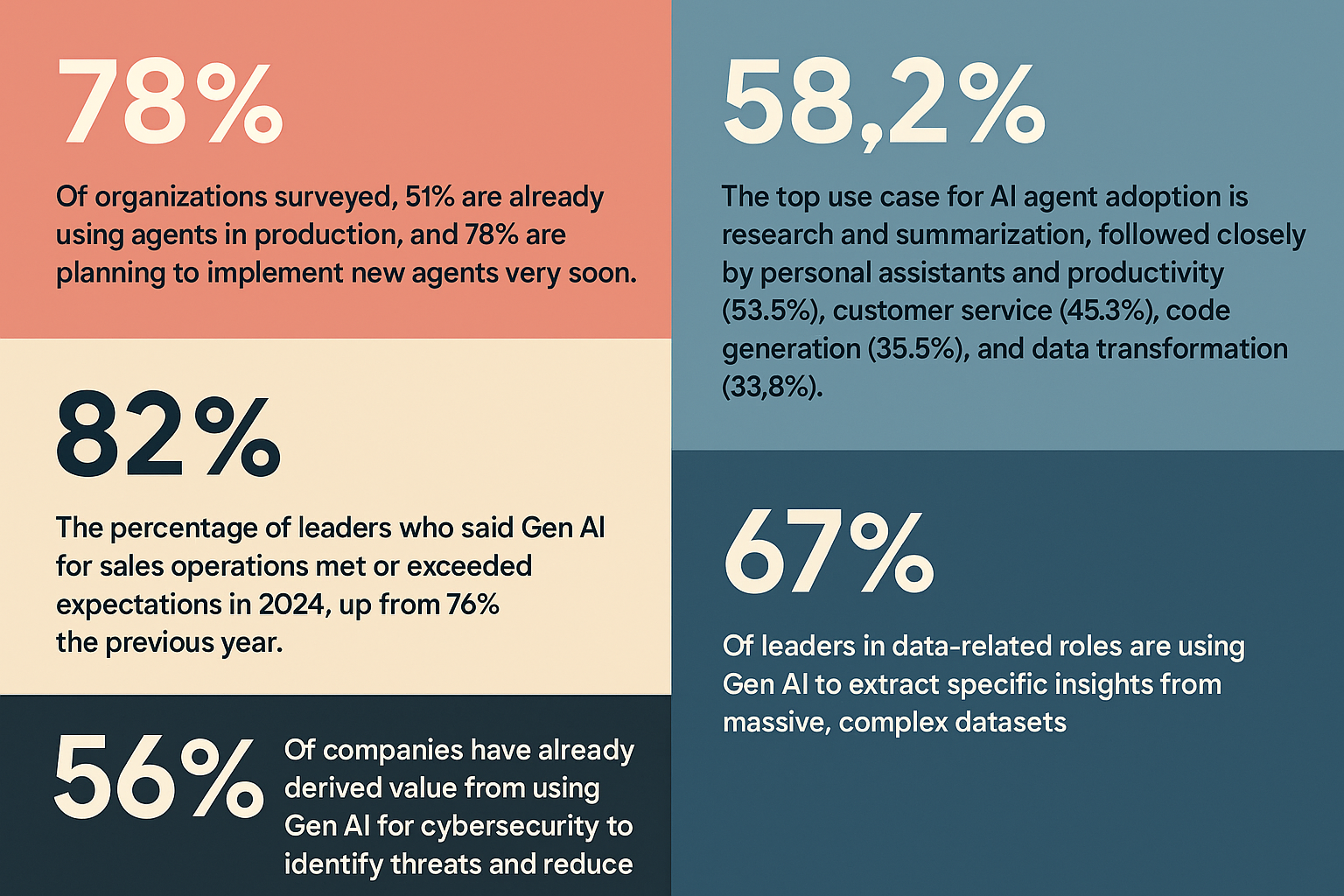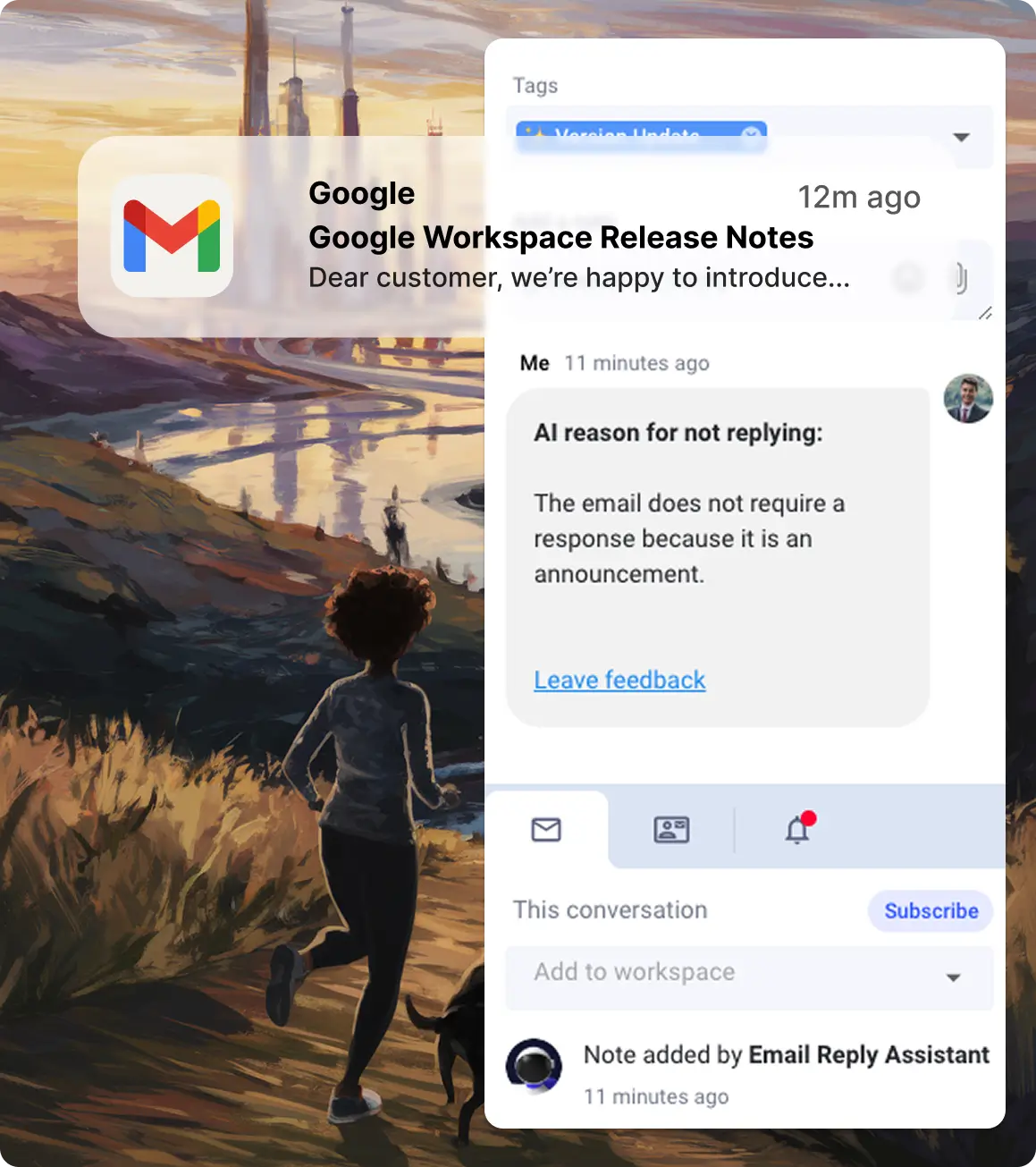As the generative AI revolution matures, the conversation in 2025 is shifting toward the next phase in intelligent systems: agentic AI.
In our latest ebook, we explore this evolution in detail. Simply put, agentic AI allows machines to not just talk like humans, but to act like them:
Autonomously operating systems that use data and cognitive understanding to take action on our behalf.
It’s no surprise, then, that AI agents are being heralded as the next major disruptor for the global economy. To help you understand what this means for your organization, we’ve pulled the most important statistics from our research. Here’s what the data tells us about the future of work.
The Macro View: The Power of AI
The foundation for agentic AI is the immense economic and operational power of AI as a whole. This reflects the current state of AI. The scale of its impact is already staggering and continues to grow.

- 13 Trillion: McKinsey reports that AI could deliver this much in additional global economic output by 2030. We can tell just how central the state of AI will be to reshaping value creation across every major industry.
- 500 Billion: The AI market is projected to exceed this value by 2025. Clearly, there is a shift from experimentation to widespread investment, further accelerating the state of agentic AI across platforms.
- 4 Trillion: By 2025, AI is expected to contribute nearly this much to global enterprise value. Such a massive market valuation means intense investment and competition.
- 60% to 70%: Early estimates suggest this much of our workday could be automated using existing generative and agentic AI technologies. That’s two-thirds of your daily grind, gone. The state of agentic AI is now about reclaiming human time.
The Immediate Future: The Rise of AI Agents
While "AI" is a broad category, the adoption of agentic AI is accelerating rapidly, moving from a niche concept to a core component of enterprise strategy.

- 99%: Nearly all enterprise applications being built today include AI agents. This near-universal adoption in new development means that agentic capabilities will soon be a standard, expected feature of enterprise software.
- 82%: A staggering majority of organizations plan on integrating agentic AI within the next 1 to 3 years.The state of agentic AI is evolving from early adoption to operational ubiquity.
- 50%: The percentage of enterprises using Gen AI that will also deploy agentic AI is expected to double from 25% in 2025 to 50% by 2027. This rapid doubling shows a clear progression from generative to agentic systems, as businesses seek to turn AI's insights into autonomous actions.
- 33%: The use of AI agents in enterprise software is set to grow from just 1% in 2024 to 33% by 2028. A 33x growth in the state of AI agents signals a tectonic shift in how software supports human work.
- 139 Billion: The AI agents market, valued at approximately $5 billion in 2024, is projected to cross this value by 2033. This dramatic expansion reflects investor confidence in the sustained rise of the state of AI.
The Current Landscape: Transformation in Progress
AI agents are not a far-off future; they are already being deployed to solve real-world business problems today.
- 78%: Of organizations surveyed, 51% are already using agents in production, and 78% are planning to implement new agents very soon. Adoption is accelerating beyond early pilots, reflecting a shift from curiosity to operational confidence in the state of AI agents.
- 58.2%: The top use case for AI agent adoption is research and summarization, followed closely by personal assistants and productivity (53.5%), customer service (45.8%), code generation (35.5%), and data transformation (33.8%).
These adoption patterns highlight how agentic AI enhances cognitive tasks across multiple departments, pushing the state of agentic AI deeper into the enterprise core.
The Business Case: Making Enterprises More Resilient and Efficient
Organizations are already realizing tangible value from AI applications, a trend that agentic AI is set to amplify.
- 82%: The percentage of leaders who said Gen AI for sales operations met or exceeded expectations in 2024, up from 76% the previous year.
- 67%: Of leaders in data-related roles are using Gen AI to extract specific insights from massive, complex datasets. The use of AI for insight extraction shows how the state of AI empowers data teams to move from information overload to decision intelligence.
- 56%: Of companies have already derived value from using Gen AI for cybersecurity to identify threats and reduce incident resolution time.
The Industry-Wide Impact
From finance to law, AI agents are reshaping how professionals work and how industries operate.
- 79%: The share of legal professionals who incorporated AI tools into their work jumped from just 19% in 2023 to 79% in 2024. In just one year, the legal sector has embraced the state of AI agents as a reliable force multiplier for knowledge-based work.
- 90%: The percentage of constituents globally who are already eager to use AI agents in public services. Public trust and enthusiasm for agentic AI reflects a societal readiness for machine collaboration in governance and civic life.
- 180 Zettabytes: By the end of 2025, this much data will be generated worldwide. With healthcare contributing over a third, AI agents will be crucial for capitalizing on it. The state of AI will be judged by its ability to make meaning from zettabytes—not just process them—and AI agents are leading that charge.
- 3 Hours: Knowledge workers spend up to 3 hours per day on email, the #1 channel for business communication. This is a key area where AI agents can deliver dramatic efficiency gains.

The Hurdles: Challenges and Considerations
The path to adoption is not without its obstacles. Navigating these challenges is critical for success.
Job market disruption
Globally, 83 million jobs could be lost to AI between 2023 and 2028. However, 69 million new jobs could also be generated. The state of AI is catalyzing a labor reshuffle that will demand policy foresight and workforce reinvention.
Reskilling is essential
80% of software engineers will have to pick up new skills to adapt. Customer service could lose 30% of existing roles, and 200,000 banking jobs could be eliminated. Workforce agility is the hinge on which the successful transition to agentic systems will turn.
Infrastructure demands
While 1 in 4 companies plan for their core business processes to use AI agents by 2025, 86% report a need to upgrade their existing infrastructure. Without robust digital plumbing, the promise of the state of agentic AI may remain out of reach for many enterprises.
Regulatory concerns
Worries about AI regulatory compliance are growing, increasing from 28% to 38% between Q1 and Q4 of 2024 alone. As trust becomes a competitive advantage, governance will shape how fast—and how far—the state of AI can expand.
The adoption gap
Demonstrating value from AI is a challenge for 97% of organizations. Further, 64% of CEOs believe success will depend more on people's adoption than the technology itself. Culture, not code, will define how effectively the state of AI agents scales inside real businesses.
As we move into this new era, the data is clear:
AI agents are set to redefine industries and reshape the modern workforce. Their ability to learn, adapt, and act autonomously makes them a critical component of the future of work.
Navigating this transformation successfully requires a deep understanding of both the opportunities and the challenges ahead, as we explain in our research..
The statistics presented here offer a snapshot of a rapidly evolving landscape.
For a comprehensive analysis of these trends, a deeper dive into industry-specific use cases, sources, and strategic insights on navigating the implementation challenges, download our full ebook.
How Gmelius Puts Agentic AI to Work
At Gmelius, we're embedding agentic AI directly into your Gmail inbox to solve the challenges of email management. Our AI agents go beyond simple automation to proactively manage, interpret, and act on your team's communications.

Here's a quick look at what they do:
- Autonomous inbox management: They automatically prioritize conversations, organize your inbox into actionable lists, and filter out threats like spam and phishing.
- Context-aware replies: Our agents draft accurate, on-brand responses by learning from your company’s past emails, help center content, and internal documents.
- Intelligent delegation: They understand team roles and automatically route emails to the right person or shared inbox, accelerating teamwork.
- Adaptive learning: Using reinforcement learning, our agents continuously improve based on feedback and usage, ensuring they evolve with your business.
Try Gmelius AI assistants for free.


.png)
.avif)
.avif)
.avif)
.avif)
.avif)